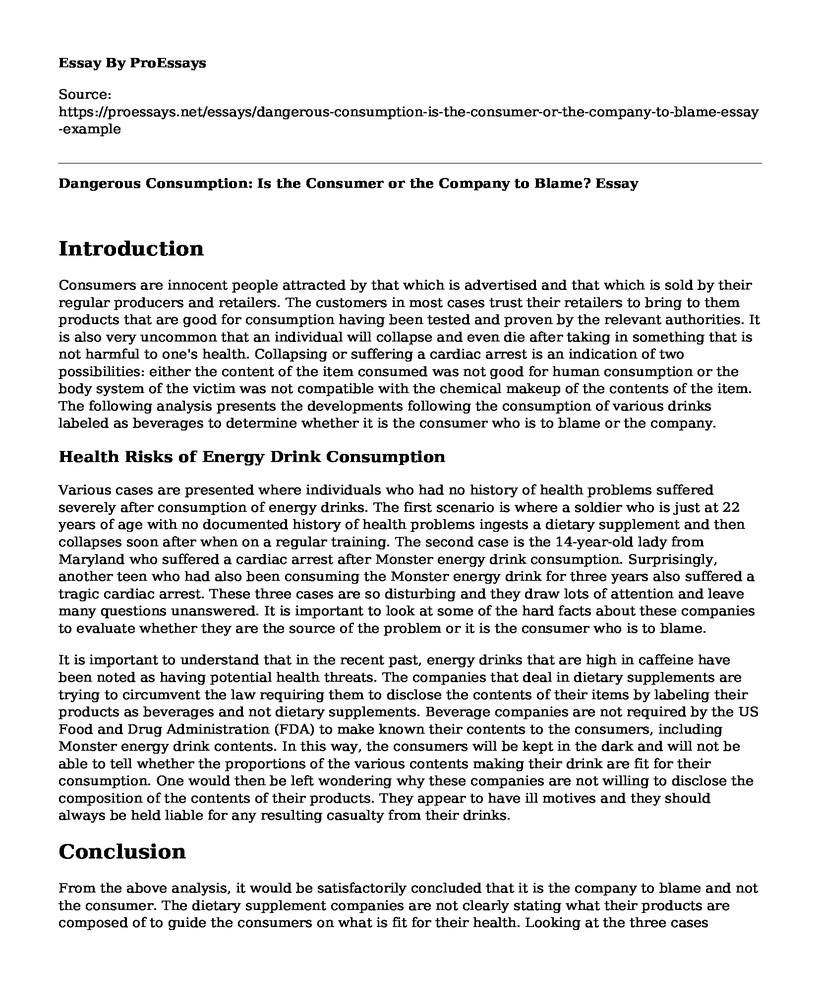Introduction
Consumers are innocent people attracted by that which is advertised and that which is sold by their regular producers and retailers. The customers in most cases trust their retailers to bring to them products that are good for consumption having been tested and proven by the relevant authorities. It is also very uncommon that an individual will collapse and even die after taking in something that is not harmful to one's health. Collapsing or suffering a cardiac arrest is an indication of two possibilities: either the content of the item consumed was not good for human consumption or the body system of the victim was not compatible with the chemical makeup of the contents of the item. The following analysis presents the developments following the consumption of various drinks labeled as beverages to determine whether it is the consumer who is to blame or the company.
Health Risks of Energy Drink Consumption
Various cases are presented where individuals who had no history of health problems suffered severely after consumption of energy drinks. The first scenario is where a soldier who is just at 22 years of age with no documented history of health problems ingests a dietary supplement and then collapses soon after when on a regular training. The second case is the 14-year-old lady from Maryland who suffered a cardiac arrest after Monster energy drink consumption. Surprisingly, another teen who had also been consuming the Monster energy drink for three years also suffered a tragic cardiac arrest. These three cases are so disturbing and they draw lots of attention and leave many questions unanswered. It is important to look at some of the hard facts about these companies to evaluate whether they are the source of the problem or it is the consumer who is to blame.
It is important to understand that in the recent past, energy drinks that are high in caffeine have been noted as having potential health threats. The companies that deal in dietary supplements are trying to circumvent the law requiring them to disclose the contents of their items by labeling their products as beverages and not dietary supplements. Beverage companies are not required by the US Food and Drug Administration (FDA) to make known their contents to the consumers, including Monster energy drink contents. In this way, the consumers will be kept in the dark and will not be able to tell whether the proportions of the various contents making their drink are fit for their consumption. One would then be left wondering why these companies are not willing to disclose the composition of the contents of their products. They appear to have ill motives and they should always be held liable for any resulting casualty from their drinks.
Conclusion
From the above analysis, it would be satisfactorily concluded that it is the company to blame and not the consumer. The dietary supplement companies are not clearly stating what their products are composed of to guide the consumers on what is fit for their health. Looking at the three cases presented, none of the consumers had a history of health issues that could result in their collapse or cardiac arrest. They were just innocent individuals taking in that which was recommended to them by specialists. If they had had the knowledge of the energy drinks contents, then most probably they would have evaluated them against the recommendations of the specialists to avoid the tragic occurrences.
Cite this page
Dangerous Consumption: Is the Consumer or the Company to Blame?. (2021, Jun 17). Retrieved from https://proessays.net/essays/dangerous-consumption-is-the-consumer-or-the-company-to-blame-essay-example
If you are the original author of this essay and no longer wish to have it published on the ProEssays website, please click below to request its removal:
- A Contemporary Nursing Leader: Dorothea Lynde Dix Paper Example
- Teenage Pregnancy: Antecedents and Consequences - Annotated Bibliography
- Essay Example on Logistics: Optimizing Supply Chain to Compete in Global Market
- Paper Example on Lack of Dental Care Access for Hispanics: Barriers and Solutions
- Essay Example on Ageing Mobility: Key to Global Age-Friendly Cities Project
- Paper Example on Pathophysiology & Pathogenesis: Studying CNS Antigens & Homeostasis Imbalance
- Thesis Sample on Preventing CLABSIs: The Ideology Behind Psychiatric Nursing







